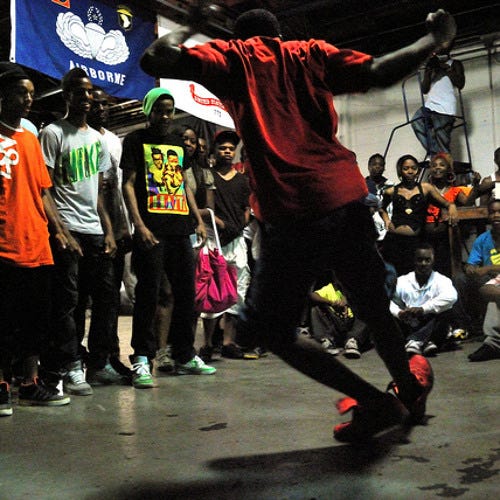I remember exactly where I was the first time I heard Juke music. I was on the DART train listening to Soundcloud mixes on my way to school, and on my 30-minute commute, one mix came on with a song with unique syncopation coupled with a Ronnie Laws sample. I was 16 years old and had never heard drums that sounded like that over jazz music. I would repeatedly listen to that 3-minute section of the mix on a continuous loop. For years I didn't know the song's name because there were no track IDs on the mix, but I later learned the song's name was called "On Your Face" by the legendary DJ Rashad (who is sadly no longer with us). From identifying that song, I discovered there was way more music with these elements that I loved so much and that it was called "Juke" music.
Now I’m 20 and still listen to Juke. Juke is significantly more popular among my peers outside of Chicago now (after Gimmie Head by DJ Clent went viral on TikTok) than when I was 16. With growing interest in the genre, I find it essential that Gen Z knows its origins and history, especially since it is a black art form. The culture surrounding Juke music is inherently black down from its name to its dance style called footwork (which incorporates elements of breakdancing). This week I was honored to speak with a living legend of Juke, Traxman.
Traxman is from the west side of Chicago and started DJing 40 years ago, taking inspiration from the music he heard growing up. He credits his parents for introducing him to Mowtown, Philly-style music, rock, and reggae music. He also says he learned a lot from his uncle and cousin (who were closer to his age) and was exposed to disco, uptempo funk, and hip-hop music. This upbringing gave him an appreciation and love for music "Back in the day when my mom gave me money for lunch and to take the bus to school. . . I spent it all on three records, and now I'm hungry, and I have to walk home, you know, but it was worth it."
This passion for music and fascination with mixing started his path in music through DJing. "It was just something about transitioning. Transitioning with two turntables with one record and another totally different record. That was amazing. So that drew me to it." Through DJing, he met some of the other legendary pioneers of Juke and was there for the beginning of Juke's development in Chicago. "I was kind of like, trying to help forefather it along with the RP Boos, DJ Rashads, DJ Spinns, DJ Clents, [and] Gant-Mans. . . A lot of people who played big roles in the real early days." He reflected on those new and exciting times when Juke was starting. "That was just something that was so fresh, so different that was being done in the neighborhood coming off the heels of what ghetto house was."
Traxman teaching a beat making workshop in Tokyo, Japan
Since then, Juke has reached far beyond Chicago, amassing massive success in Europe and Japan. Traxman has traveled the world playing his music and is going on a world tour starting next month, but he says it's still important to stay in touch with his community in Chicago. "There is a hardcore love of where I come from, where the culture is started. . . It's very important that I stay grounded. You know, and even when I'm in other places, I always find a sense of the smell and where the grassroots is at"
I spoke with him about the growing popularity of Juke music within Gen Z and how younger people are becoming exposed to artists like himself, DJ Clent, and RP Boo. With hundreds of videos posted to his song "Get Down Lil' Momma," he has seen firsthand how powerful social media can be in spreading music. "I'm gonna probably do the Get Down Lil’ Momma challenge," he said. "I always knew even years ago in Dance Mania, and this is way before social media. I would always tell Ray Barney at Dance Mania. . . That it's something bigger that's about to happen. And it won't be the same as it is now. But something. We don't know what it is. Of course, we don't know what it is."
He shared his excitement for the future of Juke music with the children of many pioneers of the genre starting to carry the torch. "We have the kids now. Now we have Lil Rio, which is Dj.mc's son, DJ Corey which is DJ Clent's son. Of course, the late DJ Rashad's [son] DJ Chad, and probably in the next two years, my son's coming. . . That's what I love because they're gonna continue [our style]. We can chill out now and do what we want."
I sincerely thank Traxman for his time. Fusion Footwork vol 6 by Traxman is available now on Bandcamp, and you can see him on tour starting July 8th in New York City.






